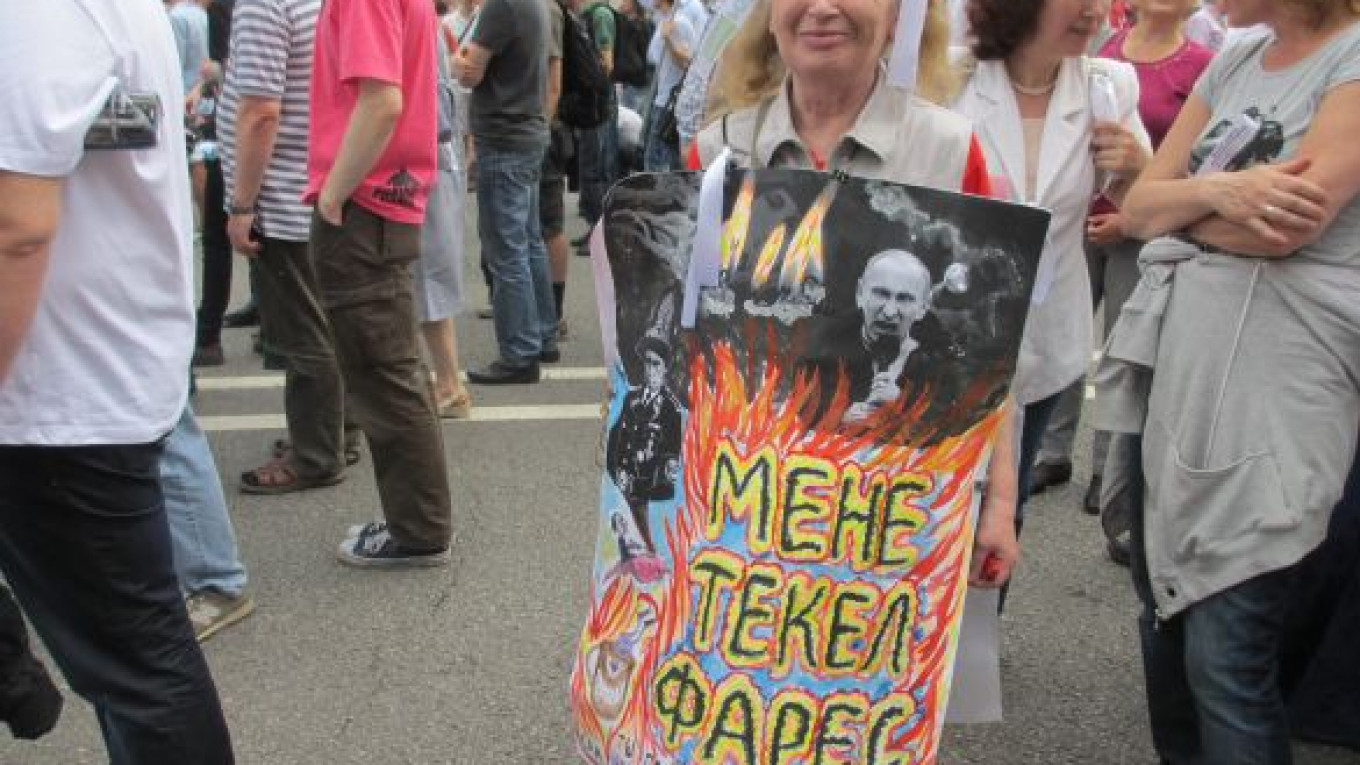There is a woman I keep running into at all the political rallies around town. Her name is Tatyana and every time I see her she is swallowed up by colorful, satirical posters that she wears front and back as a sandwich board.
For the opposition rally on Russia Day, Tatyana pulled out all the stops. On her back, she wore a series of pictures of President Vladimir Putin and Prime Minister Dmitry Medvedev pasted over her own paintings and ragged lettering. The text declared: "Awake! Do Not Let Down Your Guard! They Want to Rule Forever!"
For the front half of her statement, Tatyana dipped deeper into the shared cultural consciousness.
Against a background of various Putins apparently burning in hell and wearing the incongruous combination of a Nazi SS uniform and the medieval Russian crown of Monomakh, Tatyana enigmatically wrote, "Mene, tekel, phares" and followed that with, "You signed your own sentence yourself, Little Zaches!"
Now, I know E.T.A. Hoffman's "Little Zaches," the tale of a horrible, mean little man who takes over a kingdom and destroys it. But I'm not too proud to admit it: "Mene, tekel, phares" sent me scrambling to learn what many others already know. This is a phrase from Daniel 5:25, which usually reads "Mene, tekel, upharsin" and is translated as "numbered, weighed and divided."
All of which means, more or less, "the jig's up, dude," or "the fat lady has sung."
Tatyana is hardly alone among protesters who rely on humor and knowledge to get their point across.
One protester at the Russia Day rally was clearly a fan of Mikhail Bulgakov. You may recall Bulgakov's novel "Heart of a Dog" as the story of a street mutt who is transformed by a medical operation into a nasty, cloying, unruly and evil human being named Sharikov. Thus one of the posters I ran across on Tuesday: "Sharikov is alive and he is working as Putin."
Talgat Batalov, an actor who plays an Uzbek Jimi Hendrix in the hit play "Light My Fire" at Teatr.doc, is always wearing a wry smile on his face. And he was wearing it again Tuesday as he peered out from behind a poster he brought to the rally.
Batalov's poster consisted of an actual photograph showing a regal Vladimir Putin, known to his friends by the diminutive "Vova," being presented with what appears to be an emperor's cloak by President Islam Karimov of Uzbekistan. Batalov underscores the event in the photo with the words, "Vova! Welcome to the club!"
For those who don't know, Karimov took office in 1990 and has ruled with an iron fist for 22 years.
Some protesters are admirably laconic in their use of humor to drive a point home.
As we strolled up Strastnoi Bulvar on Tuesday I spied a young man holding aloft the simplest of posters. Two words on a blank page: "Putin Fuhrer."
The Nazi connection in protest images seems to be growing of late. One man I saw in the crowd held on high a sketch of Putin in which the Russian president looked suspiciously like Adolf Hitler. Beneath the portrait stood the words "Das ist Stabile."
Simplest of all was the poster one woman prepared out of a blank piece of white paper. It was attached to a stick and below it she attached the words, "Simply a white poster."
White, of course, has been adopted as the unofficial color of the political protests taking place since December.
Perhaps my favorite of the day was a huge pink cut-out of a mask that I spied at the end of the march on Prospekt Akademika Sakharova.
It was accompanied by no words, although no one, surely, had trouble understanding the symbolism. As everyone participating in the rally knew well, Putin just days ago signed into law new regulations for protests. Aside from increasing fines for violations by 1,000 times or more, it also banned the wearing of masks.
Thus the appearance on Prospekt Akademika Sakharova of the oversized mask, behind which there was no human to fine or arrest.
A Message from The Moscow Times:
Dear readers,
We are facing unprecedented challenges. Russia's Prosecutor General's Office has designated The Moscow Times as an "undesirable" organization, criminalizing our work and putting our staff at risk of prosecution. This follows our earlier unjust labeling as a "foreign agent."
These actions are direct attempts to silence independent journalism in Russia. The authorities claim our work "discredits the decisions of the Russian leadership." We see things differently: we strive to provide accurate, unbiased reporting on Russia.
We, the journalists of The Moscow Times, refuse to be silenced. But to continue our work, we need your help.
Your support, no matter how small, makes a world of difference. If you can, please support us monthly starting from just $2. It's quick to set up, and every contribution makes a significant impact.
By supporting The Moscow Times, you're defending open, independent journalism in the face of repression. Thank you for standing with us.
Remind me later.







